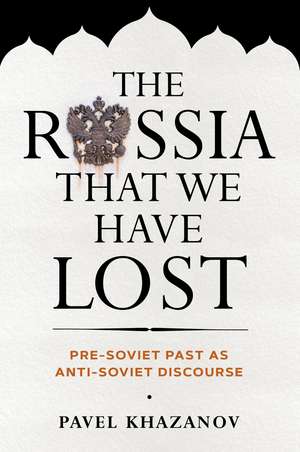The Russia That We Have Lost
Autor Pavel Khazanoven Limba Engleză Hardback – 28 noi 2023
Khazanov’s careful untangling of this discourse in the late Soviet period reveals a process that involved figures of all political stripes, from staunch conservatives to avowed intelligentsia liberals. Further, Khazanov shows that this process occurred not outside of or in opposition to Soviet guidance and censorship, but in mainstream Soviet culture that commanded wide audiences, especially among the Soviet middle class. Excavating the cultural logic of this newly foundational, mythic memory of a “lost Russia,” Khazanov reveals why, despite the apparently liberal achievement of the collapse of the Soviet Union in 1991, Boris Yeltsin (and later, Vladamir Putin) successfully steered Russia into oligarchy and increasing autocracy. The anti-Soviet memory of the pre-Soviet past, ironically constructed during the late socialist period, became and remains a politically salient narrative, a point of consensus that surprisingly attracts both contemporary regime loyalists and their would-be liberal opposition.
Preț: 527.09 lei
Preț vechi: 684.54 lei
-23% Nou
Puncte Express: 791
Preț estimativ în valută:
100.86€ • 104.05$ • 84.17£
100.86€ • 104.05$ • 84.17£
Carte tipărită la comandă
Livrare economică 26 martie-09 aprilie
Preluare comenzi: 021 569.72.76
Specificații
ISBN-13: 9780299345105
ISBN-10: 0299345106
Pagini: 208
Ilustrații: 11 illus.
Dimensiuni: 152 x 229 x 18 mm
Greutate: 0.37 kg
Ediția:First Edition
Editura: University of Wisconsin Press
Colecția University of Wisconsin Press
ISBN-10: 0299345106
Pagini: 208
Ilustrații: 11 illus.
Dimensiuni: 152 x 229 x 18 mm
Greutate: 0.37 kg
Ediția:First Edition
Editura: University of Wisconsin Press
Colecția University of Wisconsin Press
Notă biografică
Pavel Khazanov is an assistant professor of Russian at Rutgers University, where he teaches courses on Russian literature and history.
Cuprins
Contents
List of Illustrations
Acknowledgments
Note on Transliteration and Translation
Introduction
Chapter 1. Soviet Children, in Search of Imperial Grandparents: The Liberal Intelligentsia Subject and Its Historical Occlusions
Chapter 2. History Doesn’t Bear a Grudge: The Rightist Variation on the Neo-Imperial Intelligentsia Subject
Chapter 3. Dare You Come to the Square? Soviet Humanism and Neo-Decembrist Protest for the ITR Class
Chapter 4. The Intelligent Shall Become Narodnyi: The Rightist Variation on Soviet Humanism
Chapter 5. The Post-Soviet Stolypinist Project
Chapter 6. A Russia That They Have Lost? Anxiety and Immanent Critique of the Fascinated Stolypinist Subject
Afterword
Notes
Bibliography
Index
List of Illustrations
Acknowledgments
Note on Transliteration and Translation
Introduction
Chapter 1. Soviet Children, in Search of Imperial Grandparents: The Liberal Intelligentsia Subject and Its Historical Occlusions
Chapter 2. History Doesn’t Bear a Grudge: The Rightist Variation on the Neo-Imperial Intelligentsia Subject
Chapter 3. Dare You Come to the Square? Soviet Humanism and Neo-Decembrist Protest for the ITR Class
Chapter 4. The Intelligent Shall Become Narodnyi: The Rightist Variation on Soviet Humanism
Chapter 5. The Post-Soviet Stolypinist Project
Chapter 6. A Russia That They Have Lost? Anxiety and Immanent Critique of the Fascinated Stolypinist Subject
Afterword
Notes
Bibliography
Index
Recenzii
“This is nuanced discourse analysis at its best.”
“A novel interpretation of the cultural foundations of the Putin era that is equal parts fascinating and convincing. . . . Impressive in its breadth and synthesis, the text makes a compelling case that the selection and celebration of a version of Russia with 19th-century aristocratic elitist values appealed to 20th-century Soviet intelligentsia and later Putin-era oligarchs.”
“A fascinating and seminal study. . . . A welcome contribution.”
“A groundbreaking and well-argued study of the late Soviet intelligentsia’s relations with the pre-Soviet past.”
“Khazanov convincingly diagnoses the driving force of post-Soviet Russian political culture. . . . By elucidating the complexities of Soviet society and the ambiguous role of the educated middle class, he shows the deep continuities in Russian society that persist across the decades and across successive regimes.”
“An original, significant, thought-provoking contribution that examines the discourse of the late Soviet mass intelligentsia about the pre-Soviet past and incisively illustrates its continued salience in contemporary Russian cultural politics.”
“A beautifully written, and often moving, account of the construction of prerevolutionary Russian cultural memory in the late Soviet and post-Soviet periods. Khazanov’s documentation is rich, his analysis convincing, and his narrative engaging and compelling.”
